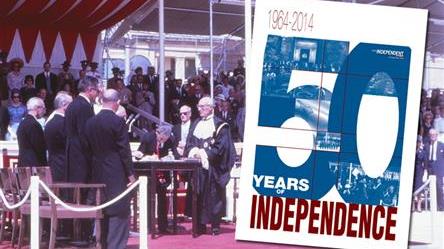Malta commemorates 50 years of independence on sunday, there is plenty to celebrate and be proud of.
Five decades after becoming a sovereign nation State we can look back with satisfaction on our achievements: a thriving economy, an enterprising business sector, a strong democracy, a generous welfare state, a vibrant civil society, a comprehensive national health service and education system and successful membership of the European Union.
Our success is a credit to the people of these islands who have shown the world that a small island State with no natural resources can not only survive but indeed thrive. Praise is due to the father of Malta’s independence, George Borg Olivier, who had the foresight to believe that Malta could become a successful sovereign country, as well as all the other prime ministers who came after him and who built on his achievements.
Malta has certainly faced challenges since it became independent. The most difficult period was without doubt during the 1971-1987 Labour administrations when, despite the introduction of a number of welcome social reforms, democracy was threatened, civil rights were eroded, human rights were trampled upon, our foreign policy was anti-Western and there was far too much government control over the economy.

That dark period in our history is now well and truly consigned to the history books, and it is to the credit of both major political parties that a solution was found – without any foreign interference – to avoid a repetition of the ‘perverse’ election result in 1981which saw Labour return to power with a majority of seats despite the Nationalist Party receiving an absolute majority of votes.
After independence, Malta later became a republic and witnessed the closure of the British military base on the island, two important achievements under Labour governments headed by Dom Mintoff.
However, it was Malta’s accession to the European Union, under a Nationalist government led by Eddie Fenech Adami, that truly completed our cycle of independence and statehood. As a result of EU membership, Malta found its rightful place in the European family of nations and was given a voice in the decision-making process of this important global bloc of nations.
It is positive that after so many years of Labour neglecting the significance of independence, a Labour government has seen it fit to truly commemorate this national day and give particular importance to Malta’s 50th anniversary of becoming a nation State. Prime Minister Joseph Muscat deserves credit for this, and in contrast to his Labour predecessors, has understood the need for national unity among the Maltese.
Indeed, independence is something that should unite us as a nation; this great achievement was brought about for the benefit of all the people of these islands, irrespective of their political affiliations, and it is right to give it the importance it deserves.
Malta has come a long way since independence but Anglo-Maltese relations have remained exceptionally strong, as evidenced by the visit to Malta by Prince William, Duke of Cambridge, for these celebrations.

Today, Malta and Britain are close partners in the EU where both countries share many common interests and aspirations. Indeed, ties between the two countries on a social, political and economic level are close, and long may they remain so.
As a nation we must look ahead with confidence to the future, not in a complacent manner – we certainly face a number of challenges, both nationally and in our region – but with determination to continue making a success of our country. So far we have done well and we must ensure that this trend continues.




